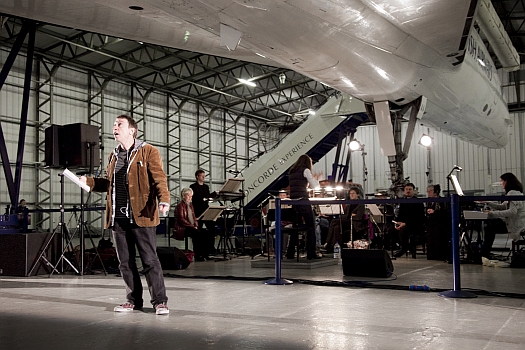 United Kingdom Philip Glass, 1,000 Airplanes on the Roof: David McKay (actor), Judith Howarth (soprano), Red Note Ensemble, Jessica Cottis (conductor), James Brining (director), in association with the National Theatre of Scotland. Concorde Hangar, National Museum of Flight, East Fortune (Scotland). 18.09.2011 (LV)
United Kingdom Philip Glass, 1,000 Airplanes on the Roof: David McKay (actor), Judith Howarth (soprano), Red Note Ensemble, Jessica Cottis (conductor), James Brining (director), in association with the National Theatre of Scotland. Concorde Hangar, National Museum of Flight, East Fortune (Scotland). 18.09.2011 (LV)

Twenty-three years after its premiere in Hangar No. 3 at the Vienna airport, Philip Glass’s spellbinding piece of music theatre, a paradoxically maximalist icon of minimalism, has returned to its roots in East Fortune in East Lothian, east of Edinburgh. The producers believe is the first hangar staging since 1988, and it was a trip.
It was a surreal scene: the audience allowed to wander around the hangar while the musicians played, Judith Howarth vocalized, and mercurial actor David McKay transformed himself into their Pied Piper. Kids were sitting on the star-crossed Concorde’s giant tires, with lovers and other couples holding hands and exchanging kisses as they followed McKay around the giant building. A member of the production crew moved around, iPad in hand, mixing the musical balances. Although interactive live broadcasts may be on the cusp of becoming reality, with millions watching and moving around the performers as if they were holographs, this new production from the Lammermuir Festival – a stunning achievement for a festival only in its second year – showed with force and striking detail the potential of the futuristic technology that 1000 Airplanes is all about.
Conductor Jessica Cottis’s work with children’s concerts and offstage Mahler orchestras, she told me afterwards, had proved invaluable to the life and humanity she brought to the performance. In her hands, Red Note Ensemble treated Glass’s music with a kind of intensity, swing and pulse that underlined just how far the once avant-gardist’s music had come from its early days, perceived (by some) as merely formless sound waves. The instrumental doubling and echoing of Judith Howarth’s gorgeous vocalizing made it clear that while she is no Linda Ronstadt (who provided the vocals for Vienna and for the first and only recording a few years later), Howarth has a voice of immense, dense beauty and Wagnerian sweep, which she wielded with supple imagination and hypnotic poise.
The sounds that came forth from Cottis and the band, who bill themselves as “Scotland’s professional contemporary music ensemble,” were charged and hallucinogenic as they needed to be, although even the extraordinary beauty of the electric keyboard’s harp simulations at the end, marvelous as they were, served notice that a real harp would have been even more ear-opening. Unexpectedly, one of the repeating “sighing” sequences seemed clearly – if most likely totally unintentionally – to be a direct descendant of the pilgrims’ march in Berlioz’s Harold in Italy. It was a very heady night.
As the passionate, obsessed and definitely lunatic “M,” Mr. McKay brought an accent reminiscent of John Hannah (with Glaswegian tones, I am assured) and a cute, scurrying persona reminiscent of a young Paul Simon. He made his opening lament, “If I could just find another wife,” a grim prelude to his surreal explorations.
As to the relevance of the aforementioned Concorde aircraft to David Henry Hwang’s text, it served as an ideal framework for the “Science-Fiction Music-Drama” that Glass describes in his title, as well as providing the “wings” necessary to carry aloft the mad, totally adorable ravings of “M.” The only downside was that Jerome Sirlin’s projections were lost in the shuffle.
At the end, when the giant doors of the hangar in East Fortune – which also turned out to be an audiophile space of staggering proportions – quietly slid open and let in the cold, clear, black night sky, the audience came over to look, mesmerized and silent, before their cheers started up.
Laurence Vittes